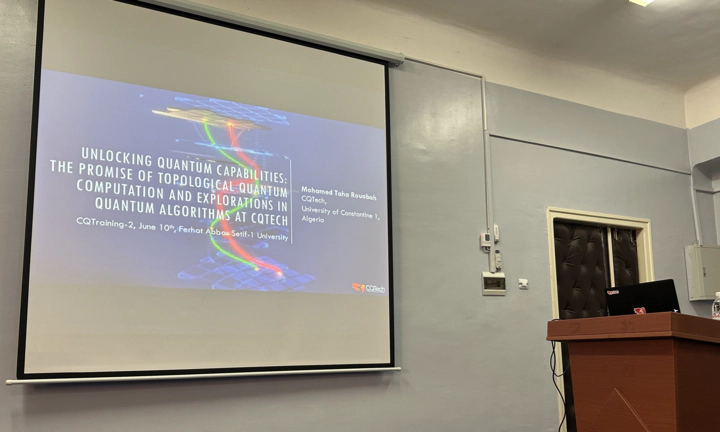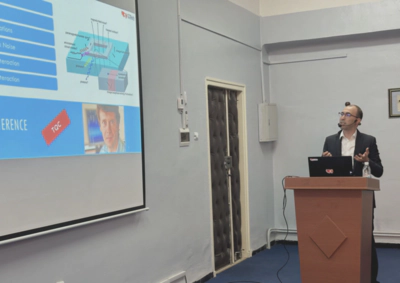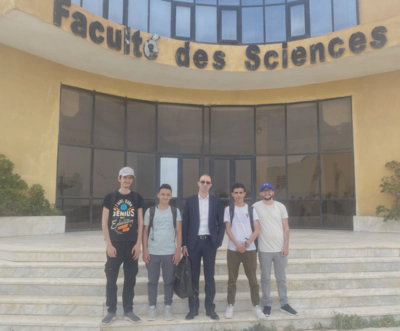CQTraining-2: A Quantum Workshop at the University of Ferhat Abbas - Setif 1, Algeria

On Monday, June 10th, 2024, the University of Ferhat Abbas in Setif hosted a dynamic quantum workshop led by CQTech, featuring Dr. Taha Rouabah, CQTech’s principal investigator, and four of CQTech’s PhD students. This workshop, organized in response to a request from the lead of the Quantum Computing Master’s program in Setif that was initiated by the Ministry of Higher Education and Scientific Research, provided a unique opportunity for Master’s students in Quantum Computing to explore the cutting-edge field of quantum technologies. The CQTraining-2 workshop was the second of its kind after CQTraining-1, held previously in Constantine.
Topological Quantum Computing & Quantum at CQTech
The day began with Dr. Taha Rouabah’s presentation, which was divided into two key segments. The first part offered a general introduction to Topological Quantum Computing (TQC), where Dr. Rouabah explained the concept of anyons, the exotic particles that play a central role in TQC, and the foundational principles of braiding and fusion. This segment aimed to explain these complex concepts and make them accessible to the students, setting the stage for more advanced discussions.

The second part of the presentation focused on the various quantum activities at CQTech. Dr. Rouabah highlighted the group’s work in TQC, Quantum Chemistry, Quantum Machine Learning (QML), and Quantum Optimization, offering a glimpse into the latest research being conducted. The response from the participants was overwhelmingly positive, with a lively Q&A session following the presentation. The students asked insightful questions that reflected their interest in the topics discussed.
Afternoon Workshops: Hands-On Quantum Experience
After a brief lunch break, the students split into two groups for the afternoon workshops, which ran from 1:00 PM to 4:00 PM. These workshops were designed to provide them with hands-on experience that allows them to apply theoretical knowledge to practical applications.
Workshop 1: Quantum Mechanics and Quantum Random Number Generation
This workshop, led by Messaoud and Nacer , started with a review of the basics of Quantum Mechanics, introducing Quantum Computing, and explaining foundational ideas like superposition and entanglement. It then moved on to Quantum Random Number Generation (QRNG), where the students got to apply these principles. The interaction during this workshop was excellent, with some participants demonstrating a particularly strong grasp of QRNG, adding to the collective learning experience.
Workshop 2: Quantum Key Distribution
The second workshop, conducted by Abdellah and Imad, similarly began with a review of Quantum Mechanics and an explanation of Quantum Computing, with a specific emphasis on entanglement. The session then focused on Quantum Key Distribution (QKD), a vital technology for secure communication in the quantum era. This workshop also saw great engagement from the students, who were keen to understand the real-world implications of this technology.
A Positive and Productive Atmosphere
The overall atmosphere of the workshop was incredibly positive. The organizers, particularly those responsible for the Quantum Computing Master’s program at the University of Setif, did an excellent job in coordinating the event and ensuring that everything ran smoothly. The participants were enthusiastic and engaged, and the sessions were enjoyable for everyone involved.
Achieving the Workshop’s Goals

The primary goal of the workshop was to provide the students with hands-on experience, bridging the gap between theory and practice. We aimed to illustrate the direct applications of what they had learned in their coursework, and we’re pleased to say that this goal was fully met. The students walked away with a deeper understanding of many aspects related to quantum technologies and a greater appreciation for the practical applications of their theoretical knowledge.
Events like this one are crucial in nurturing the next generation of quantum scientists and engineers, and we look forward to seeing how these students will contribute to the field in the future.